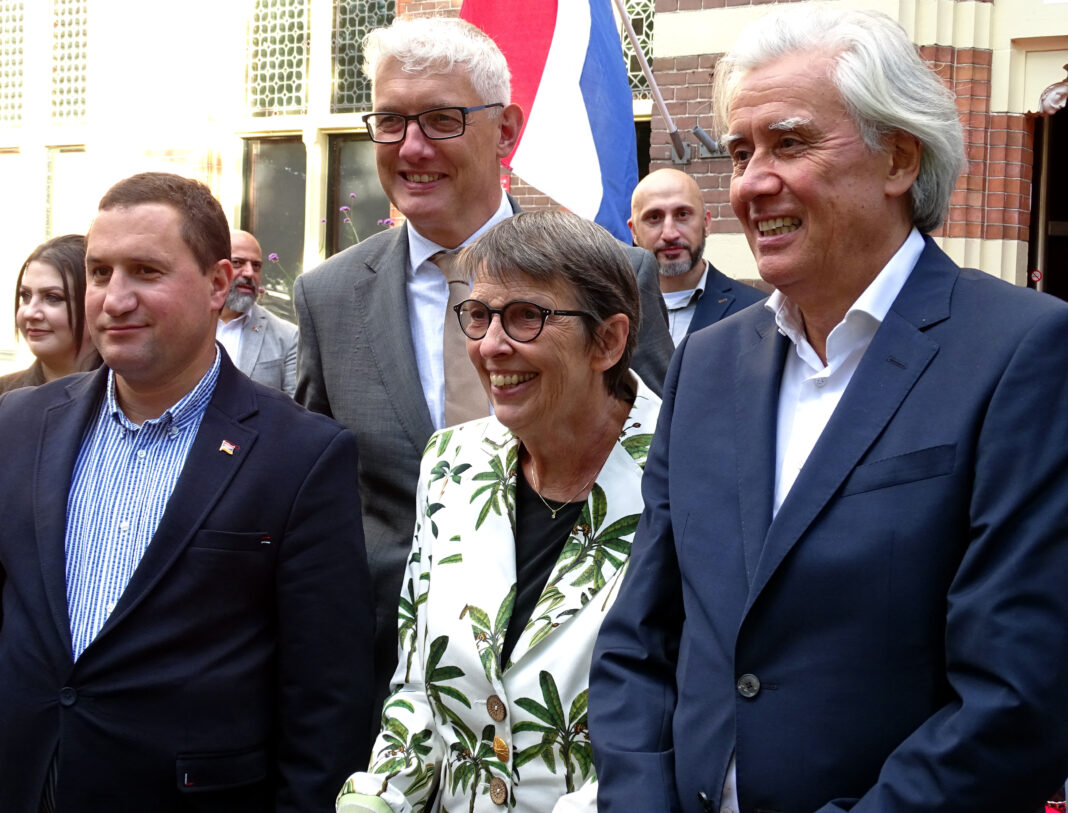By Dr. Lorenca Bejko
The 31st anniversary of Armenia’s independence was commemorated with a series of events in the Netherlands, organized by the Embassy of Armenia and the King’s Commissioner in the province of Drenthe.
The day began with a visit to Frederiksoord village, where the Governor of Drenthe, Ms. Jetta Klijnsma, welcomed over 40 ambassadors, representatives of international organizations, the Ministry of Foreign Affairs and journalists and guided them through historical sites included in the UNESCO World Heritage List. The group then moved to Assen, where they visited the exhibition “Under the Spell of Ararat: The Treasures of Ancient Armenia” at the Drents Museum.
A reception dedicated to the National Day of Armenia followed, with H.E. Ambassador Tigran Balayan delivering a speech that highlighted the challenges faced by Armenia, including Azerbaijan’s aggression and the need for international support.


The ambassador also mentioned the strengthening of Armenian-Dutch relations, including the visit of the Armenian Prime Minister to the Netherlands and the implementation of agreements reached during the visit. The day ended with an awarding ceremony, where the Governor was presented with the Medal of Honor of the Embassy, the Director of the Museum, Mr. Harry Tupan, received the Gold Medal of the Ministry of Education, Science, Culture and Sport, and Mr. Nikolay Romashuk-Hayrapetyan was awarded the Medal of Honor of the Ministry of Foreign Affairs of Armenia for his contribution to the organization of the exhibition and the promotion of Armenian Culture in the Netherland.

The Ambassador Tigran Balayan’s welcoming remarks at the celebration of the 31st anniversary of Armenia’s Independence in the Netherlands highlighted the importance of the event and expressed gratitude to the King’s Commissioner in the province of Drenthe and the Governor of Drenthe for their hospitality.
The Ambassador noted that the last time a group of Ambassadors visited Drenthe was in 2009 and expressed excitement about the opportunity to gather in the premises of the famous Drents Museum.

The Ambassador also acknowledged the challenges faced by Armenia, including the military aggression in violation of international law and order, and emphasized the need for solidarity and assistance in defending the country against autocracy. The Ambassador highlighted the importance of the year 2022 in terms of Armenia’s bilateral relations with the Netherlands, including the visit of Armenia’s Prime-Minister in May and the implementation of agreements reached during the visit. The Ambassador concluded by thanking everyone for sharing this important day with them.

Armenia has a long history of science and technology, especially during its time as part of the Soviet Union.
Armenia’s 1991 separation from the Soviet Socialist Republics caused temporary scientific and economic isolation, including cancelled computer orders and a lack of access to cutting-edge scientific research.
It was the USSR’s “Silicon Valley,” producing computers for all other republics while also housing thriving advanced institutes in physics, chemistry, biology, astrophysics, and computational science, among other fields.

Armenia had the largest electron accelerator in the USSR, competing with accelerators at some of the world’s leading institutions, such as the Massachusetts Institute of Technology in the US and Deutsches Elektronen-Synchrotron (DESY) in Germany.
The events enabled the Armenian community in the Netherlands to celebrate their country’s independence and rich history, raise awareness about Armenia’s contributions to science and technology, and promote cultural exchange between Armenia and the Netherlands.



